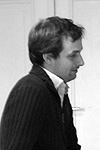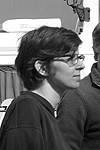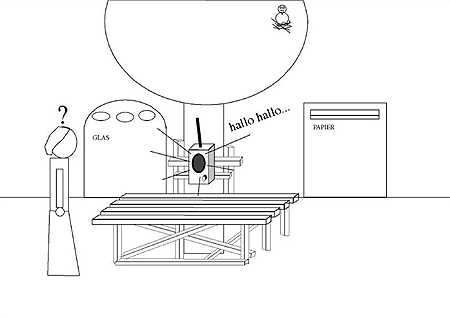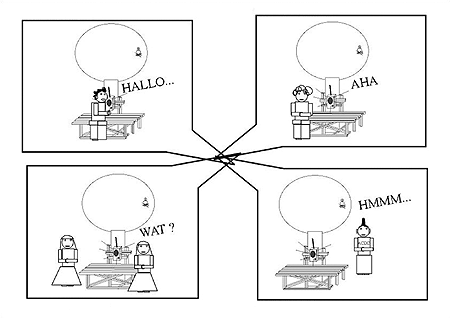
  Kathrin Böhm (born in 1969) Andreas Lang (born in 1968) lives in London Stefan Saffer (born in 1969) (didn't participate of the symposium) lives in Berlin |
Neuköllsch Benches & Walkie-talkies In Neukölln there are no structures for communication. Though this is a problem not specific to Neukölln, it is intensified there by its multitude of languages, cultures and interest groups. It is not that Neukölln has nothing to say or to that there's nothing to be said for it. It's just that there is a lack of possibilities and places for communication which can remain publicly available. 1. Benches With our project we will supply Neukölln with new temporary meeting points, which will be acoustically connected. I 1 I 'Neuköllsch' will be a temporary network of transmitting and receiving stations, which could become long-term speech and listening points. . The project examines the use of public space and communicative exchange. At public and semi-public places in Neukölln (traffic islands, park trees, corners of houses, back yards, pavements, etc.), we will place simple seating objects constructed from wooden batoning. The structures will be put up spontaneously, without official permission, to test the specific area's administrative structures as well as its personal ownership and collective potential. In 2001, we built a similar wooden structure on a traffic island in Berlin's Mitte, which occupied the space around a tree in the form of a bench. The construction is simple: Batons are screwed together to form a stable framework. During construction the new bench already became a meeting point: Neighbours wanted to know what was going on, passers-by stopped, children came to help. The bench around the tree replaced its former function as dog toilet. The bench is still there, unharmed and unauthorised. 2. Walky Talkies At every new "place" a simple walkie-talkie will be installed, so that the bench becomes part of a transmitting and receiving network in Neukölln. In this way, stories can now be spread right through the neighbourhood. Passers-by can participate, as can friends who live a few blocks away. Stories, music, private conversations, etc. can be sent and received. One walkie-talkie will remain mobile, and we plan to cooperate with a local youth group to research and broadcast reports and tales from the neighbourhood. We are planning to carry out a series of recordings with the youth group that deals with the other temporary projects in 'Okkupation'. How are the projects being talked of locally? In what way will the actions be translated to 'Neuköllsch'? It will become a sort of "radio programme", and leaflets which inform of the upcoming broadcasts will be distributed on the benches. At the same time, we will use the network for on-site live reports on the 'Okkupation' projects. The ancient tradition of storytelling by word of mouth is found in all cultures. Languages, noises and sounds mark the public space particularly in Neukölln, which consists of so many different cultures. The street becomes the place for stories and history, as well as for oral arrangements and negotiations. Our project will try to collect different local "languages" and perspectives, in order to translate them anew. By interconnecting a neutral transmitting/receiving unit, we will facilitate a direct discussion. But the small delay inherent in the communication process will also create time for listening, talking and meeting, in order to discuss and reflect on what has been heard |
|
|
Websites: www.publicworksgroup.net Websiten: www.mobileporch.net |
 
|